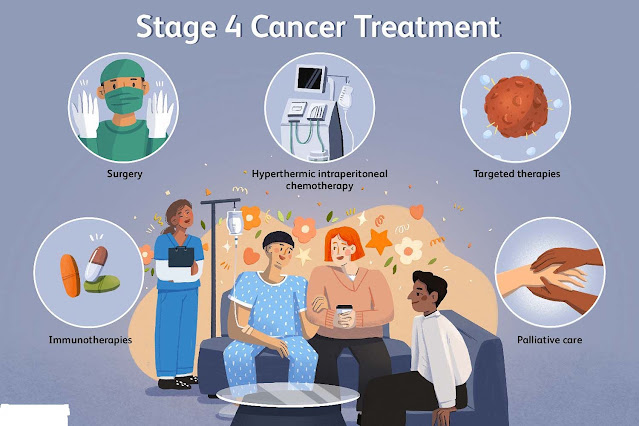Stage 4 adenocarcinoma survival rate:
Adenocarcinoma is a type of cancer that originates in the glands of the body and is one of the most common types of cancer in the United States. Stage 4 adenocarcinoma, also known as metastatic adenocarcinoma, refers to a cancer that has spread from its original location to other parts of the body.
The
survival rate for stage 4 adenocarcinoma varies greatly depending on various
factors such as the type and location of the cancer, the person's age and
overall health, and the treatments received. In general, the survival rate for
stage 4 adenocarcinoma is lower compared to earlier stages of the disease.
According
to the American Cancer Society, the five-year survival rate for people with
metastatic cancer is only about 5%. However, this statistic is not meant to
predict an individual's prognosis, as some people may live much longer than
five years after being diagnosed with stage 4 adenocarcinoma.
The
treatment options for stage 4 adenocarcinoma are mainly focused on extending
the person's life, managing symptoms, and improving the person's quality of
life. The treatment options may include surgery, radiation therapy,
chemotherapy, immunotherapy, and targeted therapy. The treatment plan will be
tailored to the individual's specific needs and may involve a combination of
treatments.
It is
important for people with stage 4 adenocarcinoma to work closely with their
healthcare team to determine the best treatment options for them. Regular
monitoring and follow-up care are also crucial in order to detect any changes in
the cancer and ensure that the person is receiving the best care possible.
In
addition to medical treatment, people with stage 4 adenocarcinoma may benefit
from support services, such as counseling, support groups, and complementary
therapies, to help them cope with the emotional and physical effects of the
disease.
In
conclusion, stage 4 adenocarcinoma is a serious and advanced form of cancer
that can be challenging to treat. However, with the right combination of
treatments, support, and care, people with stage 4 adenocarcinoma can continue
to live meaningful and productive lives. It is important for people with stage
4 adenocarcinoma to have a strong support system and to work closely with their
healthcare team to determine the best treatment options for them.
Why is stage 4 cancer incurable:
Cancer is
a disease in which abnormal cells grow and divide uncontrollably, invading
nearby tissues and spreading to other parts of the body through the bloodstream
or lymphatic system. Cancer is typically classified into stages based on its
size, location, and the extent of spread to other parts of the body. Stage 4
cancer refers to cancer that has spread from its original location to distant
parts of the body and is considered to be the most advanced stage of cancer.
Unfortunately,
stage 4 cancer is often considered incurable because, by definition, it has
spread to other parts of the body, making it difficult to completely remove all
of the cancer cells. When cancer cells spread to other parts of the body, they
can form new tumors in those locations, which can be difficult to treat and
remove. This is why stage 4 cancer is often considered incurable.
However,
while stage 4 cancer may not be curable in the traditional sense, it can still
be managed and treated in order to extend the person's life, relieve symptoms,
and improve the person's quality of life. This is referred to as palliative
care or end-of-life care.
The
treatment options for stage 4 cancer may include surgery, radiation therapy, chemotherapy,
immunotherapy, and targeted therapy, among others. The goal of treatment is to
slow the growth and spread of the cancer, relieve symptoms, and improve the
person's overall quality of life. In some cases, treatment may also help to
extend the person's life.
It is
important for people with stage 4 cancer to work closely with their healthcare
team to determine the best treatment options for them. Regular monitoring and
follow-up care are also crucial in order to detect any changes in the cancer and
ensure that the person is receiving the best care possible.
In
addition to medical treatment, people with stage 4 cancer may benefit from
support services, such as counseling, support groups, and complementary
therapies, to help them cope with the emotional and physical effects of the
disease.
In
conclusion, stage 4 cancer is considered incurable because it has spread to
other parts of the body and is difficult to completely remove all of the cancer
cells. However, with the right combination of treatments, support, and care,
people with stage 4 cancer can continue to live meaningful and productive
lives. It is important for people with stage 4 cancer to have a strong support
system and to work closely with their healthcare team to determine the best
treatment options for them.







0 Comments